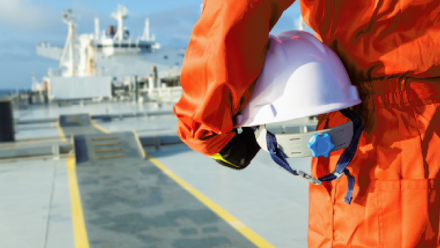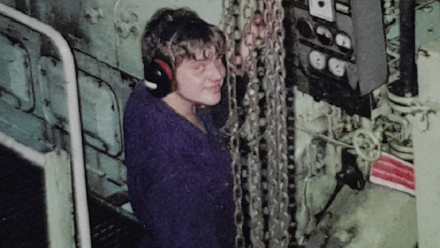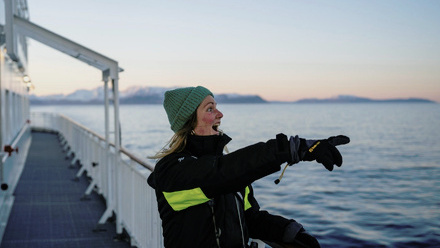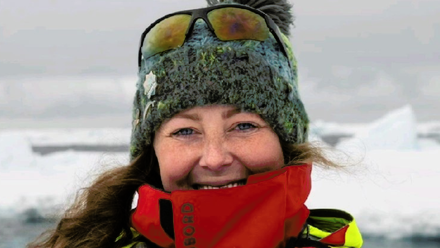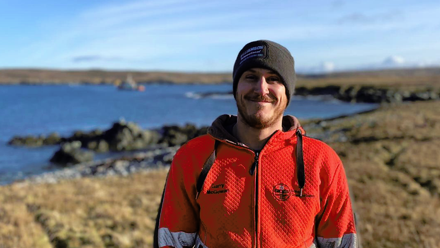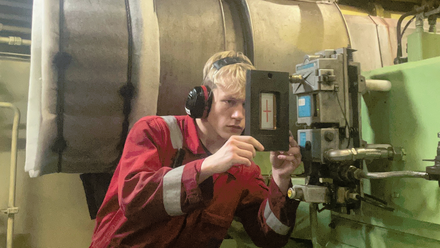Fellow: IMarEST can be hub for defence technical policy
Captain Ali Ashour, the first Gulf Cooperation Council (GCC) FIMarEST in the defence domain, sees the Institute as a platform for innovation and global cooperation.
From helping to build a boat in his grandfather’s backyard to officer cadet training at the Saad Al Abdullah Academy for Security Sciences in Kuwait, Captain Ali Ashour has long been passionate about shipping.
He is currently an industry-based researcher at BAE Systems and the Peridynamics Research Centre (PDRC) at the University of Strathclyde (UoS), focusing on naval capacity building, policy design, and the strategic feasibility of Command, Control, Communications, Computers, Cyber, Intelligence, Surveillance and Reconnaissance (C5ISR), especially autonomous hybrid naval assets and data integrity.
“My role operates at the intersection of engineering practice, institutional strategy, and scientific research,” he explains.
He is the first non-Commonwealth national selected for the strategic defence partnership research between BAE Systems and the UoS’s PDRC, a technical evolution from NASA’s Langley research labs.
“My research there is a new chapter in wider legacy of Anglo-GCC maritime scientific defence cooperation,” he says, adding that at heart he remains an engineer. “I’ve been driven since childhood by a love for tinkering and fixing things.”
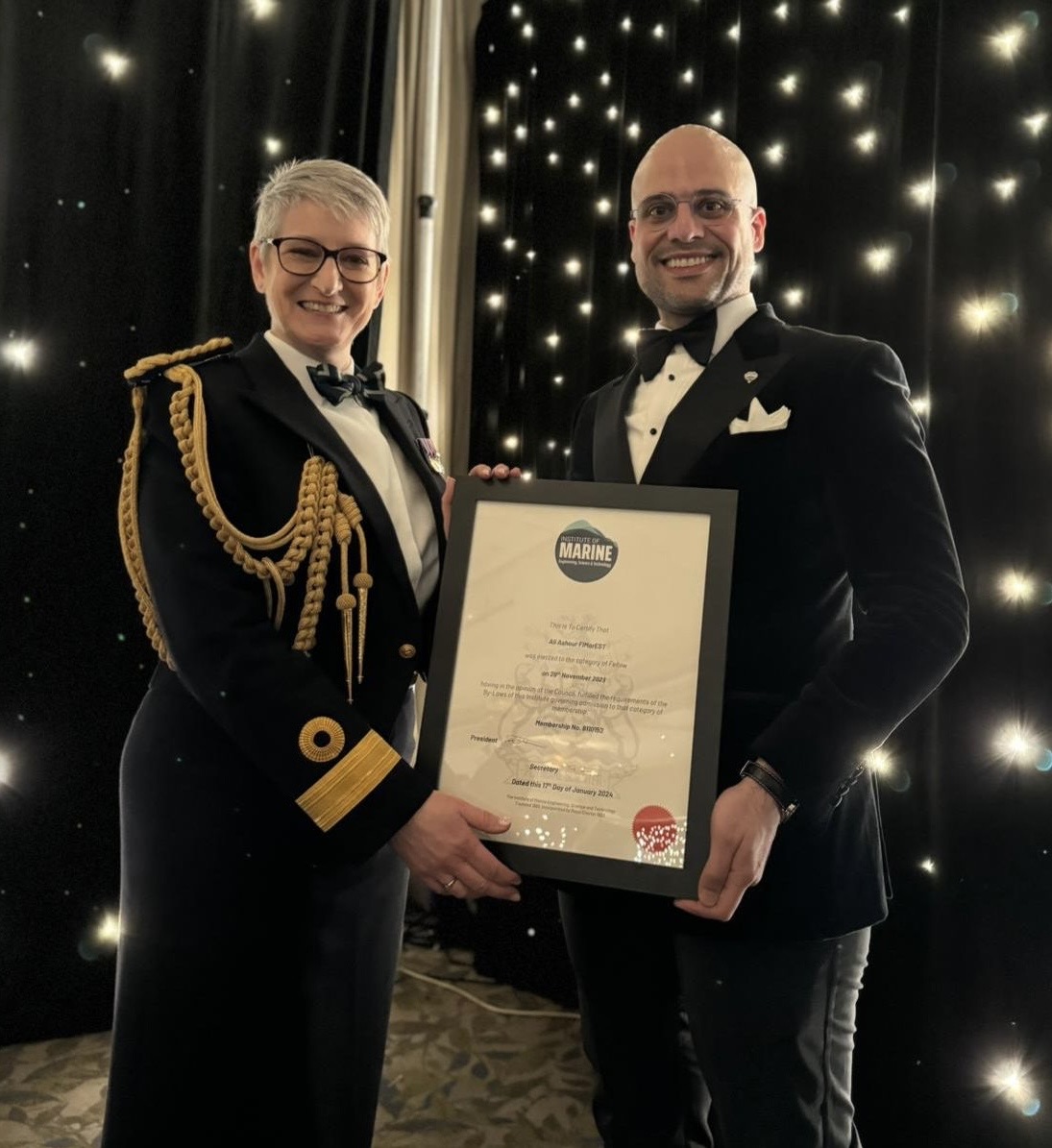
A bridge to cooperate
His appointment as the first GCC Fellow of IMarEST within defence is an important milestone, signalling that maritime research cooperation, collective strategic foresight, and scientific diplomacy from the GCC can contribute meaningfully to global maritime thinking.
“I see this is as crucial in the new political age not only to prevent war and disputes cascading, but also to ensure we are best protected, and maritime trade can continue unimpeded,” he states, pointing out that the appointment also reflects the integration of defence sector expertise into maritime academic institutions and vice versa, enhancing the role of Gulf perspectives in global dialogue.
“I see it as a bridge-builder, allowing ideas and frameworks from defence innovation to positively enhance civilian maritime sustainability and governance.”
The GCC region plays a substantial and multifaceted role in global shipping and energy markets, contributing significantly through maritime transit, energy exports and sovereign investments. Almost a third of global crude oil exports and around 12 to 15% of global LNG (liquefied natural gas) exports originate from the region. Nearly a fifth of global maritime oil trade passes through the Strait of Hormuz.
Across the region there are investments in naval platforms, port infrastructure, cyber readiness, and academic research partnerships.
Bahrain, hosting CMF 152 and the IISS Manama Dialogue, continues to serve as a regional anchor for cooperative maritime security frameworks, while Saudi Arabia’s Vision 2030 includes ‘THE RIG’ project, a transformation of decommissioned offshore platforms into maritime tourism assets.
Qatar’s rapid rise in academic infrastructure and early integration of Amiri naval forces into IMarEST doctrine positions it as a key research-driven maritime actor across multiple domains. The UAE, through its establishment of the TASNEEF classification society, is moving toward international maritime regulatory influence. Oman’s development of Al-Duqm port and its surrounding ecosystem reflects a comprehensive maritime-industrial strategy embracing both civilian and military use.
Finally, Kuwait’s strategic investment in Mubarak Port and the planned development of its islands underscores a long-term maritime vision.
“Training such specialists can take longer than educating a neurosurgeon, yet this is not fully recognised in maritime labour discourse,” notes Captain Ashour.
He sees his fellowship at IMarEST as part of this evolving narrative and was encouraged to see IMarEST’s initial engagement at the Combined Naval Leaders Conference this year, which he called “a huge step in the right direction”.
“Moving forward, I believe IMarEST must deeply integrate into the heart of maritime security and defence technical discussion, not only to reflect the technical complexity of the sector but to anchor itself as part of the solution and as a neutral hub for forward-thinking maritime capacity building,” he says.
This includes promoting foundational engineering "common sense” principles and acting as a catalyst for discussions on today’s evolving maritime cyber threat environment.
For Royal Navy Engineers and other defence maritime experts, IMarEST provides clear affiliation Engineering Council Chartership routes. With professional recognition now critical across defence, IMarEST affiliation connects you to global standards, cutting-edge peer-reviewed research, forward thinking policy design hubs, and an influential network that strengthens your technical credibility on an international level. Discover more about the benefits of IMarEST membership now.
This article represents the views of Captain Ali Ashour and not necessarily IMarEST.
Tell us what you think about this article by joining the discussion on IMarEST Connect.
Image: dhows in Bahrain. Credit: Shutterstock.
Inline image: Captain Ali Ashour with Commodore Sharon Malkin, recieving his fellowship. Credit: IMarEST.

